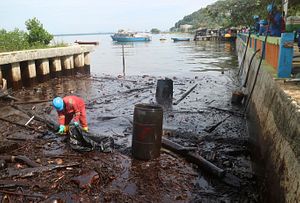Recently, there was an oil spill in Indonesian waters originating from drilling activities by a state-owned oil and gas company, PT Pertamina (Persero). The oil spill was allegedly caused by a gas leak in the YYA-1 Block Offshore North West Java (ONWJ). It began on July 12, polluting the north sea of Karawang, West Java. As of this writing, PT Pertamina is deploying 44 vessels to continue its efforts to combat the oil spill, with assistance from the Oil Spill Combat Team (OSCT) Indonesia and Boot & Coots, an American company with experience resolving oil spill incidents in the Gulf of Mexico. In total, more than 1,500 personnel and pieces of equipment have been deployed to cope with the oil spill.
This is the second oil spill involving PT Pertamina in the last two years. In March 2018, there was an oil spill after a pipe owned by PT Pertamina broke when snagged by the anchor of the MV Ever Judger at Balikpapan Bay, East Kalimantan. That spill polluted approximately 7,000 hectares of waters at Balikpapan and killed five people, in addition to destroying mangroves and marine life. The 2018 case saw the Ministry of Environment and Forestry file a court case against PT Pertamina, the owner of MV Ever Judger, Fleet Management Limited, and Ever Judger Holding Company Limited. They were collectively requested to pay compensation of 10.15 trillion rupiah or approximately $711 million. The compensation will be allocated to the ecosystem services, environment recovery or restoration, and costs for environmental dispute settlement.
An oil spill causes very serious environmental pollution and may damage society massively, impacting both daily activities and livelihoods. Therefore, it is reasonable that the compensation given to the affected parties can be very large, even amounting to hundreds of millions of U.S. dollars. Likewise, considering that the seas under Indonesian control have a greater area than its land, it’s no surprise that the Indonesian government is extremely strict in term of law enforcement when it comes to environmental pollution at sea, particularly due to oil spills.
The Indonesian Environmental Law – along with academics and environmental activists — recognizes the strict liability of any individual, company, or other legal entity causing environmental pollution, including oil spills. The Ministry of Environment and Forestry has pursued this liability in practice and the law is often implemented by Indonesian judges.
According to the Indonesian Environmental Law, any person or company who commits environmental pollution, either intentionally or due to negligence, will face fines and imprisonment. Article 99, paragraph 1 of the law states that a person who consciously or intentionally commits environmental pollution that violates sea water quality standards will be penalized with imprisonment for a maximum of 10 years and a fine of a maximum of 10 billion rupiah.
Meanwhile, article 99 paragraph 2 of the Indonesian Environmental Law states that the person who commits such a violation due to negligence will be penalized with imprisonment for a maximum of 3 years and a fine of a maximum of 3 billion rupiah.
Other than the above, however, the responsible party should pay money to fund both compensation and environmental recovery. These funds may be requested by the affected parties through environmental dispute settlement.
In Indonesia, environmental settlement is mostly resolved through the courts, especially environmental pollution incidents involving and incurring damages to many parties. Furthermore, the Indonesian Environmental Law also recognizes the rights of several parties – including the Ministry of Environment and Forestry and impacted environmental organizations — to file a lawsuit against a person causing an oil spill in order to request funds for compensation and environmental recovery.
Damages may be requested under the various grounds: compensation for the decrease of a fishermen’s income, decreased tourism business income, irreversible ecosystem damages, court costs, and others. Unlike the criminal charges above, this compensation has no maximum value, therefore the judges may grant the request from the affected parties running into the millions of dollars.
Given that the recent oil spill has caused damage to more than 1,000 fishermen, the compensation provided by PT Pertamina is expected to be a large amount of money. Furthermore, locals living around the Karawang waters lost their livelihoods as fishermen, because the fishing grounds were polluted by the oil spill. It is worth noting that there will be potential impacts to 15,000 hectares of fish ponds on the Karawang coast, spread across 23 villages. In any case, legally speaking, PT Pertamina shall be liable because the oil spill originated from its drilling activities.
The board of PT Pertamina publicly announced that their company will settle this dispute amicably by providing compensation to the parties affected by the oil spill incident and conducting environmental recovery. However, it is still possible for the affected parties to sue PT Pertamina in district court. Likewise, the local government or the Ministry of Environment and Forestry may also sue PT Pertamina seeking money for environmental recovery. Most importantly, cooperation between the Indonesian government and PT Pertamina to settle this issue collectively is urgently needed to protect both the people and the environment affected by the oil spill in fair way.
I Ketut Dharma Putra Yoga is a litigation lawyer specializing in shipping, international trade, Insurance and reinsurance. He graduated magna cum laude in 2018 from the University of Lampung, Indonesia, majoring in business law.

































